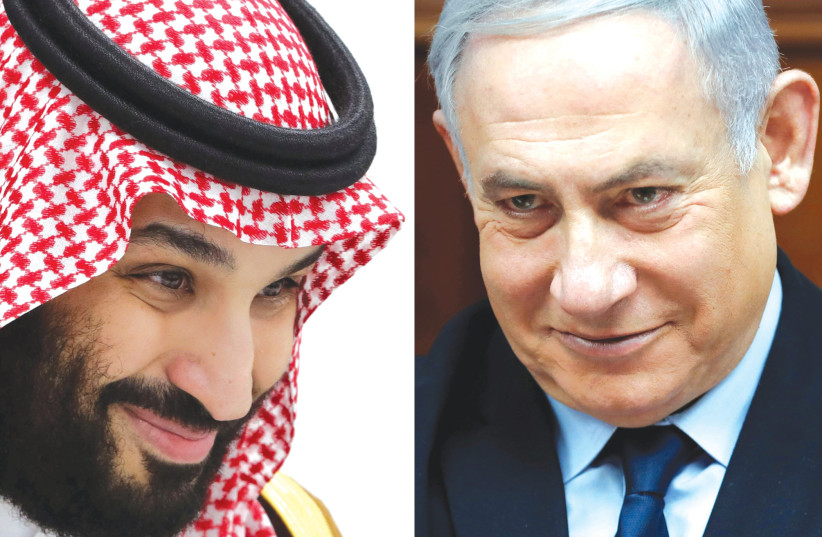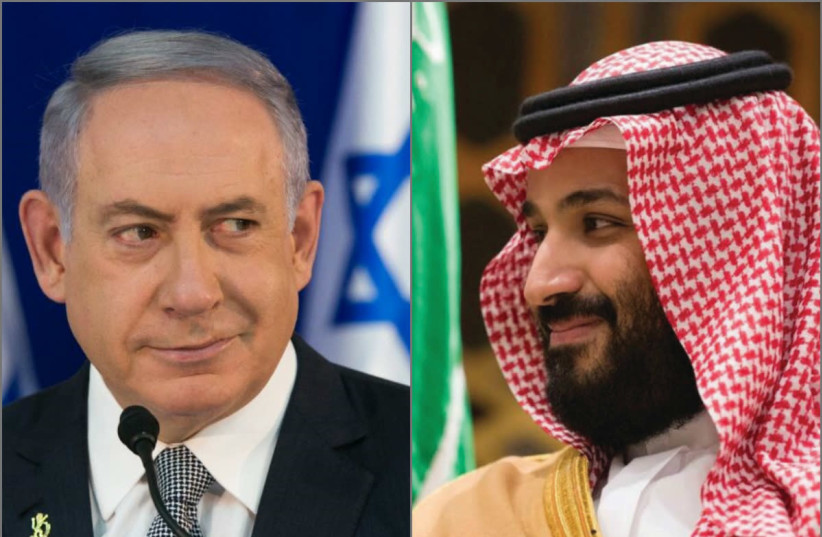Saudi deal won’t harm Israel, official says amid nuke fears
In Cyprus, Netanyahu focused on the economic benefits of such a deal explaining that it could create a new electricity coordinator that could link Europe with India via the Middle East.

A normalization deal with Saudi Arabia won’t harm Israeli security, a high-level official told reporters amid fears about demand from Riyadh that any agreement must include US support for a civilian nuclear program that includes uranium enrichment.
In Cyprus on Monday, Prime Minister Benjamin Netanyahu spoke publicly about the possibility of a deal, as he delivered remarks to the media during a joint press event with Cypriot President Nikos Christodoulides and Greek Prime Minister Kyriakos.
“There is now the possibility that we might have the expansion of the Abraham Accords to normalization with Saudi Arabia,” Netanyahu said.
The deal itself would primarily be between Washington and Riyadh but it would involve a normalization deal with Israel.
Last week, Defense Minister Yoav Gallant met with top US diplomatic officials to encourage progress in widening the normalization wave with Sunni countries, like Saudi Arabia, but also emphasizing the need to maintain Israeli qualitative military superiority.

Israeli Prime Minister Benjamin Netanyahu and Saudi Arabian Crown Prince Mohammed Bin Salman (credit: MARC ISRAEL SELLEM/REUTERS)
Gallant also passed on a document put together during recent ongoing meetings of the defense establishment’s security chiefs and their top experts to clarify the exact details of what kind of nuclear program the US might offer the Saudis and how they would prevent such a civilian nuclear program from evolving into a military one.
Kan News confirmed that Mossad Director Davdi Barnea and IDF Chief-of-Staff (Lt.-Gen.) Herzvi Halevi weighed in on that document.
The defense minister met with US National Security Council Coordinator for the Middle East and North Africa Brett McGurk, US Assistant Secretary of State for Near Eastern Affairs Barbara Leaf, and US Ambassador to the United Nations Linda Thomas-Greenfield.
Both McGurk and Leaf are expected to travel to Saudi Arabia this week.
Focus on the economic benefits of an electricity corridor
In Cyprus, however, Netanyahu focused on the economic benefits of such a deal explaining that it could create a new electricity coordinator that could link Europe with India via the Middle East.
It was one of the joint projects he discussed with Christodoulides and Mitsotakis as part of the trilateral event in Nicosia.
Netanyahu placed the idea of a new fiber optic energy coordinator within the context of regional normalization deals, particularly given that Israel has already created ties with the United Arab Emirates, Bahrain, Morocco and Sudan.
As part of the regional thaw toward Israel, Cohen was in Bahrain on Monday to promote a pending free trade agreement between the two countries, to follow the one that exists with the UAE.
In Cyprus, Netanyahu spoke of a new electricity connector “that is being organized right now from mainland Greece to Crete to Cyprus.”
That European Union-supported EuroAsia Interconnector subsea cable is envisaged to carry up to 2,000 megawatts of electricity to eventually link grids from Israel and Cyprus to Greece.
Netanyahu said it could also involve countries to the east of Israel.
He also referenced the possibility that Israel could work cooperatively with Cyprus and Greece to export its natural gas to Europe. Decisions on that score will be made within three to six months, he said.
Earlier this year, Cyprus suggested expediting gas to market by the creation of a short pipeline linking Israel’s east Mediterranean gas fields to a liquefaction facility on Cyprus, which could then be shipped to Europe.
“We agree that natural gas and renewable energy is a prime pillar of cooperation in the region, especially in light of the recent geopolitical developments,” Christodoulides said. “Especially in Europe, (it) dictates the need for energy diversification and increased interconnectivity,” he said.
Netanyahu said Israel was also “eagerly pursuing” being part of a planned subsea electricity link.
“We would like to have it connected obviously to Israel and possibly to the east of Israel, Netanyahu said.
Last Netanyahu also spoke of cooperative efforts to combat Iranian-backed terror and the growing threat of fires due to climate change, particularly with the help of artificial intelligence.
Netanyahu also discussed opening Israel’s dairy industry.“We intend to open the dairy market very soon to Greek and Cypriot—and other—imports,” Netanyahu said. He quipped that the Cypriot yogurt may be tastier than the Israeli brands.
“We like your food. We like your dairy products. We like your yogurt,” Netanyahu said, adding that with it came to market competition, “May the best yogurt win. You have a pretty good chance at winning.”
The three leaders spoke of how Israel’s normalization efforts in the Middle East could be leveraged to expand their trilateral projects.
Reuters contributed to this report.
var cont = `Sign up for The Jerusalem Post Premium Plus for just $5
Upgrade your reading experience with an ad-free environment and exclusive content
Join Now >
`; document.getElementById(“linkPremium”).innerHTML = cont; var divWithLink = document.getElementById(“premium-link”); if(divWithLink !== null && divWithLink !== ‘undefined’) { divWithLink.style.border = “solid 1px #cb0f3e”; divWithLink.style.textAlign = “center”; divWithLink.style.marginBottom = “40px”; divWithLink.style.marginTop = “40px”; divWithLink.style.width = “728px”; divWithLink.style.backgroundColor = “#122952”; divWithLink.style.color = “#ffffff”; } (function (v, i){ }); <!–
var cont = ` COVID-19 & The Jews: Challenges and Opportunities
Join The Jerusalem Post for its inaugural virtual event
Watch Now >
`; document.getElementById(“linkPremium”).innerHTML = cont; var divWithLink = document.getElementById(“premium-link”); if(divWithLink !== null && divWithLink !== ‘undefined’) { divWithLink.style.border = “solid 1px #122952”; divWithLink.style.textAlign = “center”; divWithLink.style.marginBottom = “40px”; divWithLink.style.marginTop = “40px”; divWithLink.style.width = “728px”; divWithLink.style.backgroundColor = “#122952”; divWithLink.style.color = “#ffffff”; } (function (v, i){ }); –>
Content retrieved from: https://www.jpost.com/middle-east/article-757577.